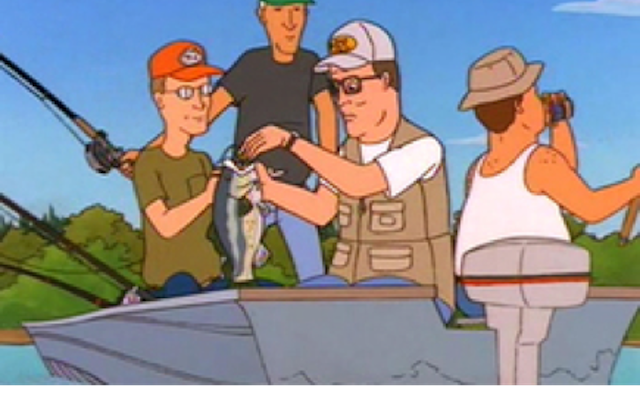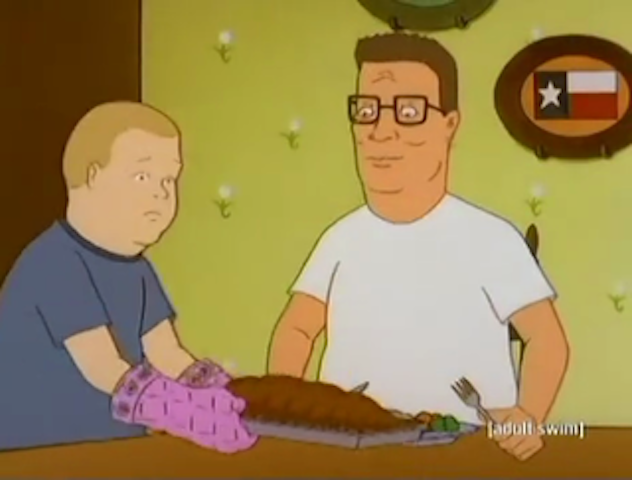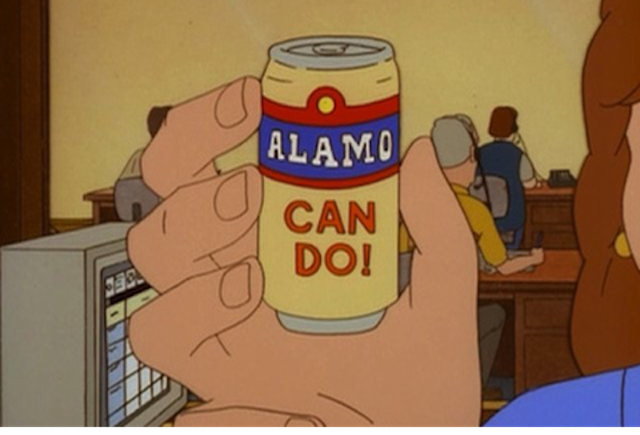17 Unwarranted Expectations on King of the Hill
Ryan Edwards
King of the Hill, created by Mike Judge, provides its viewers with a sitcom starring an “All-American” family man named Hank Hill. Hank is a manly-man, the guy who grills and catches fish, drinks beer, and puts his own meat on the table. Packed with comedic action of day-to-day adventures and encounters, King of the Hill raises an important question regarding stereotypes and expectations of masculinity in America. Amanda Lotz describes how the depiction of men such as a straight white man, are “fostering perceptions of gender roles and how they have done their work by prioritizing certain characteristics.” These characteristics are unwarranted and throughout the episodes of King of the Hill, a pattern emerges depicting how television has told us men should be. This pattern represented by Hank, his son Bobby, and others on the show, paints a generalized picture while developing expectations of masculinity and gender roles for the shows viewers. Overall, the expectations are degrading at best and regardless of each of the characters true story, regardless of who they actually are, the show consistently points out what men should and should not be through its commentary and day to day activities. How can all men be expected to be one way or another? Shows such as King of the Hill, simply present in inaccurate representation of what masculinity means and how it should be depicted to viewers and, most importantly, the young men watching.
As an angler and outdoorsmen myself, I grew up in an environment similar to that of Hank Hill. My grandfather taught me how to fish, my Dad taught me how to play sports, how to fix things, build things, and even clean and put meat on the table, cooked on the grill, of course. To be honest, everything I grew up doing would fall under the category of “manly,” and my question is, “What does it really mean to be manly?” Bryan Rindfleisch describes Southern masculinity as the “prized landed independency, mastery over female, child, and slave dependents, the use of violence to enforce patriarchy, and the importance of honor to unite the South’s white male community.” Though not all aspects apply to King of the Hill, Rindfleisch’s depiction is extremely accurate when discussing gender roles and the representation of how men should act. In “Jumpin’ C,rack Bass,” Bobby doesn’t take to fishing. Bobby even asks, “Why don’t we just buy the fish” and though this episode takes a comedic turn in an entirely different, humorous, drug use direction, this episode highlights the fact directly that Bobby isn’t manly. This stereotypical and limited definition of what masculinity means is a poor representation of what it truly means to be a man.

Rebecca Feasey, in Masculinity and Popular Television, points out an extremely valuable model that clarifies the major issue with the depiction of characteristics and expectations of men. She states, “The model of masculinity is said to be the ideal image of the male against which all men are judged, tested and qualified.” In the episode “Goodbye Normal Jeans,” viewers get the full picture of how Bobby doesn’t meet the model’s standards. He is a talented son who isn’t an outdoorsman, a mechanic, or a manly-man. Bobby is someone who has other interests, and it looks as if Hank misses out on these opportunities to build a stronger relationship with his son. He misses these opportunities because of his inaccurate and misunderstanding of masculinity. For example, Hank hears about Bobby taking a home-economics course and failing then states, “Of course you’re failing home ec. You’re a guy.” Though many fathers who have a son hope that their son will take to sports, there are countless other activities that a young man can aspire to be and take up on a daily basis, including cooking.
In the grand scheme of things, the main point is that the activities, words spoken, and what a man physically does does not make him a man. What makes one a man is one’s character, and that should be the point of judgement. King of the Hill does not depict this initially, and for most of the show, there is a disconnect between hopeful expectations and disapproval of other actions that are, in fact, just as manly. Even though I believe in the importance of teaching young men how to fish, hunt, and even something as simple as changing a tire, I do not believe that King of the Hill gives the proper description of what a man can and should be. In fact, the irony is that King of the Hill encounters an issue typically only discussed about women, and what women can and should be.

Now, on a positive note, King of the Hill is extremely funny. The comedy is relatable to me and how I was raised. Over time and by viewing more and more episodes, I have come to see how this sitcom can be viewed as misleading and even degrading. Again, in “Goodbye Normal Jeans,” Hank’s wife Peggy is frustrated with the fact that Hank is enjoying Bobby’s cooking over hers. At one point, Peggy even feels as if her only role left in the house is to please Hank in bed. This sitcom reinforces gender stereotyping, and I firmly believe the show misses its opportunity to destroy these stereotypes instead of extending them. A fresh catch has to be cooked, and who’s to say the woman can’t fish and the man can’t cook.
When looking at King of the Hill, the big question is whether or not the sitcom portrays one type of masculinity, and it is important to separate portrayal of masculinity from who the characters actually are as individuals. Though Dale is not a stud, and many of the sitcom’s characters aren’t exactly the so called “perfect definition” of manliness, the show paints this standard and inaccurate picture of what masculinity looks like. In “‘I Am Not Down With That’: King of the Hill and Sitcom Satire” by Ethan Thompson, the author states that the show’s debut includes “a bag of pork rinds and a Weber barbeque grill.” Thompson goes on to tell us that show was targeting a young audience and that the NASCAR demographic quickly became a fan base for the series. In addition, everything about the show relates to Texas, including the creator, Mike Judge, a native of the Lone Star State. Overall, the show consistently has fundamental values that go into developing this of who the characters are trying to be and how a generalized version of what masculinity should be understood (Thompson 38).

Finally, Joshua C. Shepherd advances his own thesis regarding masculinity and, specifically, masculinity in King of the Hill. Shepherd’s paper, “There Better Be a Naked Cheerleader Under Your Bed,” includes the statement, “In short, Bobby does not embrace the same markers of masculinity as Hank, which causes disruption, complication, and alleviation from episode to episode.” This thesis aligns with mine: Bobby is the source of this conflict because the boy is everything but his father. Shepherd calls Hank Hill a stereotypical Texan, a father figure who loves football, fixing his truck, drinking beer with his makes friends, and supporting conservative political and social issues. The deeper viewers look at Hank and Bobby, the more they are able to see the disconnect, the painted picture of one way over another, and an image of a son who isn’t everything his father hopes for him to be. This is where King of the Hill is wrong. King of the Hill did not hit the bullseye in making its mark of breaking down this idea of a generalized expectation of masculinity (Shepherd).
In conclusion, King of the Hill aligns directly with the standard definition of men that television has historically depicted. The show has followed the footsteps of many others that utilize comedy as a way to create entertaining content at the expense of reality and truth. The fact is, men don’t have to be an outdoorsman; not all men want to fish, and men should not be defined by the depictions of Hollywood and what sells advertising time. On the contrary, new shows are beginning to break this longstanding trend, and I am optimistic that they will hit the mark and seek comedy that breaks the standard degrading women, certain non-white people, and non-straight people while placing unwarranted expectations on men. The characteristics of men that should be standard are respect, honesty, and equality. Power, control, and violence are not what it takes to be manly.
Ryan Edwards is a Senior at Wake Forest University from Palm Beach, FL. He is a Communication major and Entrepreneurship minor.
Works Cited
Feasey, Rebecca. Masculinity and Popular Television. Edinburgh: Edinburgh UP, 2008. Web. 28 June 2017.
Lotz, Amanda D. Cable Guys: Television and Masculinities in the Twenty-first Century. New York: New York UP, 2014. Web. 28 June 2017.
Rindfleisch, B. C. (2012), “What it Means to Be a Man”: Contested Masculinity in the Early Republic and Antebellum America”. History Compass, 10: 852–865. doi:10.1111/hic3.12005
THOMPSON, ETHAN. “‘I Am Not Down with That’: King of the Hill and Sitcom Satire.” Journal of Film and Video, vol. 61, no. 2, 2009, pp. 38–51. JSTOR, www.jstor.org/stable/20688623
Shepherd, Joshua. “There Better Be A Naked Cheerleader Under Your Bed.” Representations of Southern, Working Class. Texas State University. San Marcos, Texas, May 2011.

